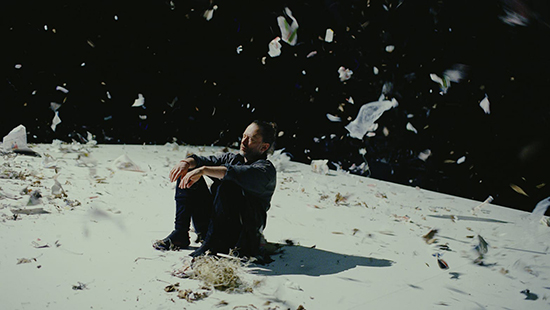Thom Yorke has always had a paradoxical relationship with technology. His albums, either with Radiohead or without, tend to express fears of digitisation and its dehumanising effects. Yet since the late ‘90s, he’s been drawn to electronic sounds and approaches – Radiohead turned away from guitars and started crediting band members for “playing the laptop”. After all, what better way for Yorke to express his technologically induced paranoia than through technology itself?
So perhaps it should come as no surprise that Yorke has turned to Netflix, the company whose streaming innovations have ushered in a new age of film consumption, to produce and release Anima, a short musical film directed by Paul Thomas Anderson. This is just the latest chapter in the chequered history of Yorke versus the Internet: from Radiohead’s radical pay-what-you-want online release of In Rainbows to his calling Spotify “the last desperate fart of a dying corpse”. More recently, prior to the release of A Moon Shaped Pool, Radiohead deleted their whole online presence, a move described by artist and collaborator Stanley Donwood as “a way of getting rid of all of what had gone before”.
Anima is marketed as a “one-reeler”, referring to the short film format that became popular in the early silent era, in which one reel of film would run for around 10 to 12 minutes. Despite this analogue allusion, viewers won’t need to go anywhere near anything mechanical to watch Anima – unless you count opening the lid of a laptop. Such is the nature of film-watching in the Netflix era, where buying a physical ticket has been replaced by clicking a button. But here, there’s an unnerving and somewhat unprecedented tension between the film’s content and its release strategy.
Anima is broadly about the overwhelming fragmentation and speed of modern life, presenting disorienting spaces and malfunctioning mechanics accompanied by a skittish electronic soundscape. Yorke’s character is an everyman pursuing a woman through dark tunnels, dizzying caves, and oppressive hordes of dancers; he spends most of the film just trying to keep up with the rush of it all.
However, note how Anima’s Netflix tile includes a tag that states: “15 min”. There is a great irony in using a short runtime – and thus a high speed of consumption – as a selling point for a film that seems to criticise the very culture of perpetual acceleration.
Constant internet access and social media as life support allows access to more and more content, but in ever shorter bits and pieces: tweets over breakfast; half an article on the bus; a flick through Instagram at the desk. Anima seems to argue that this creates a society that’s tired, overstimulated, and undernourished – Yorke and Anderson are acutely aware of our fast-food habits of content consumption. And yet Anima, streaming to phones everywhere and proudly declaring its snappy runtime, surely encourages these habits. At the very least, it capitalises on them.
Anima finds itself in the troubling position of perpetuating the very issue it decries. On one hand, this makes the film is all the more relevant: by making its viewers participate in the horrors of overconsumption, Anima is better served to denounce them, and to therefore bring about a change in viewers’ habits. The film’s opening images of zombified commuters might seem more chilling when they look suspiciously like yourself, as you stare gormlessly at the tiny screen in your lap on the 8am tube. Maybe releasing Anima through Netflix offers the only way for Yorke and Anderson to target those they think need their message most.
Mainly, though, releasing a short film online proves just another example of Yorke’s strength for online marketing. Radiohead’s In Rainbows release was one of the most talked-about musical events of 2007, spawning countless thinkpieces about the future of music distribution and raising the band’s profile to stratospheric levels. When they deleted their tweets and Instagram posts ahead of A Moon Shaped Pool, this tactic dominated headlines – by apparently rejecting social media, Radiohead were creating an enviable social media buzz. Yorke might not like technology, but he’s pretty good at using it.
Can we blame an artist trying to reach an audience? With Anima, it seems unlikely that any other platform would have picked up a film with such scant prospects for theatrical release or awards prestige. Anderson’s feature films routinely perform well both critically and commercially, but the same could not be expected of a short, musical, abstract art piece. Luckily for Yorke and Anderson, the film fits Netflix’s content-heavy business model – Netflix doesn’t need their releases to do well individually, so long as their platform is busy and interesting enough to keep paying subscribers entertained.
But it was that very same business model of overwhelming, high-speed content which created the film’s internal contradiction. So maybe the purists are justified when they sharpen their pitchforks for any film that isn’t watched on the silver screen by an audience huddled together in a hushed and darkened room.
Perhaps the problem, then, is not with Netflix, but with viewers’ insatiable appetites for continuous stimulation – appetites that Anima warns against. Pay attention to the film’s moments of beauty: a quiet, physical human connection; a fragment of near-pastoral peace. When Yorke does find solace, it’s in the arms of another, looking into her eyes rather than chasing after things. Even the film’s ending, which leaves him melancholically alone, is warm and comforting: he simply sits and watches the sun rise, as the soundtrack is at its most contemplative. If you take one thing from watching Anima, let it be to not watch any more Animas. Sit quietly with a loved one. Look out of your window. When consuming becomes suffocating, it’s best to just breathe.
Anima is available to stream on Netflix now



